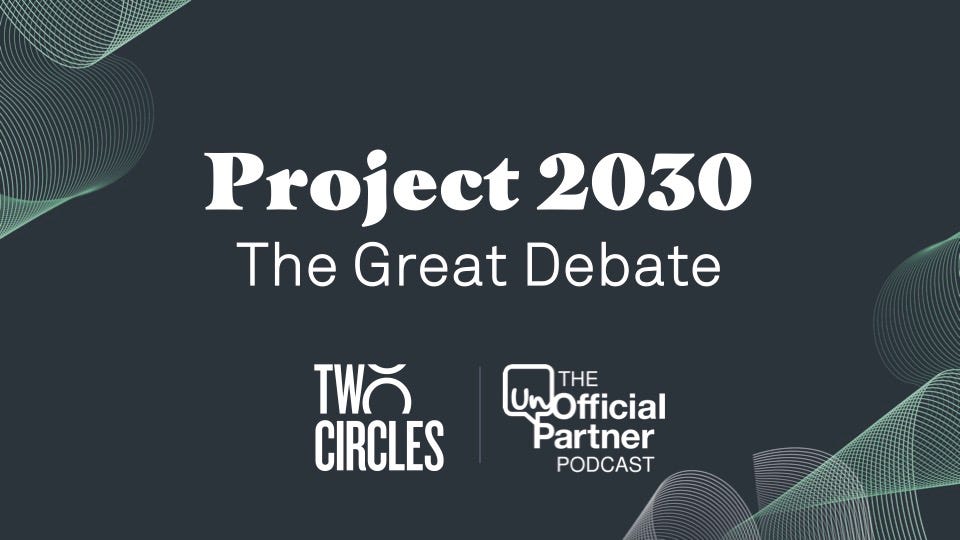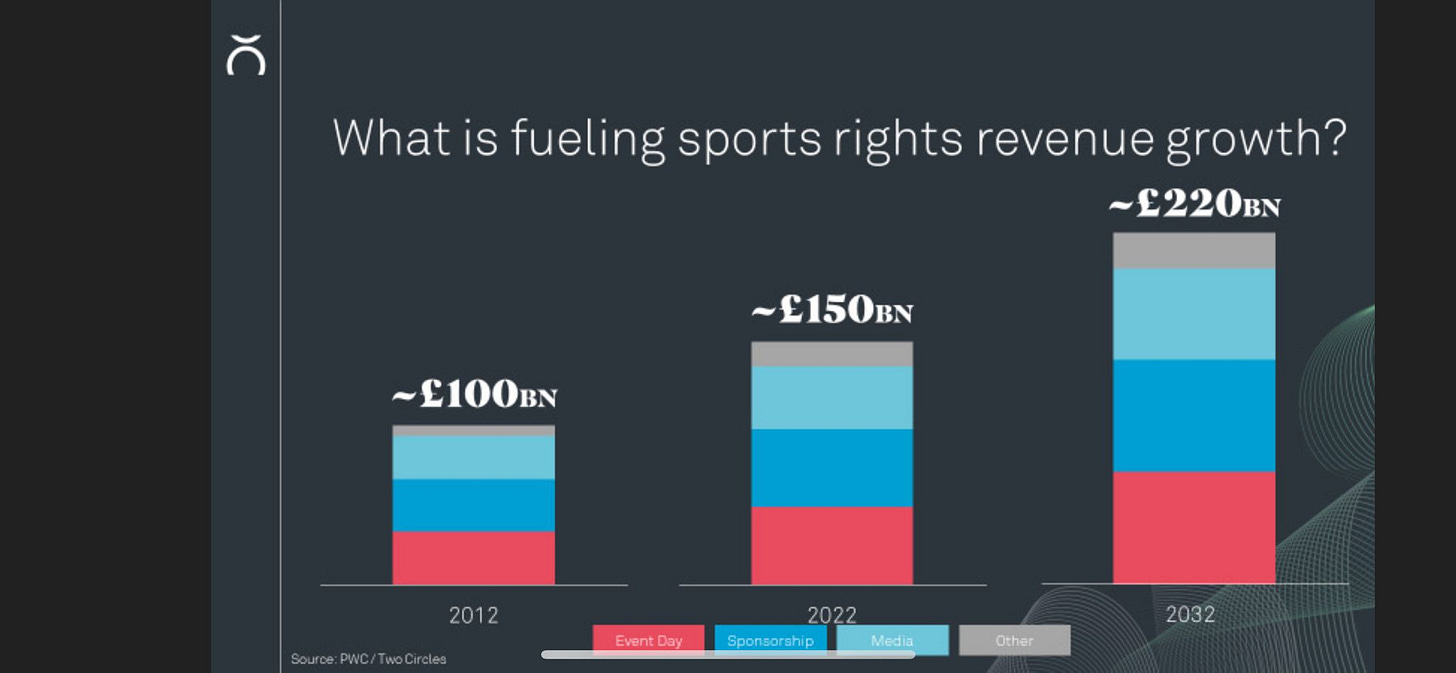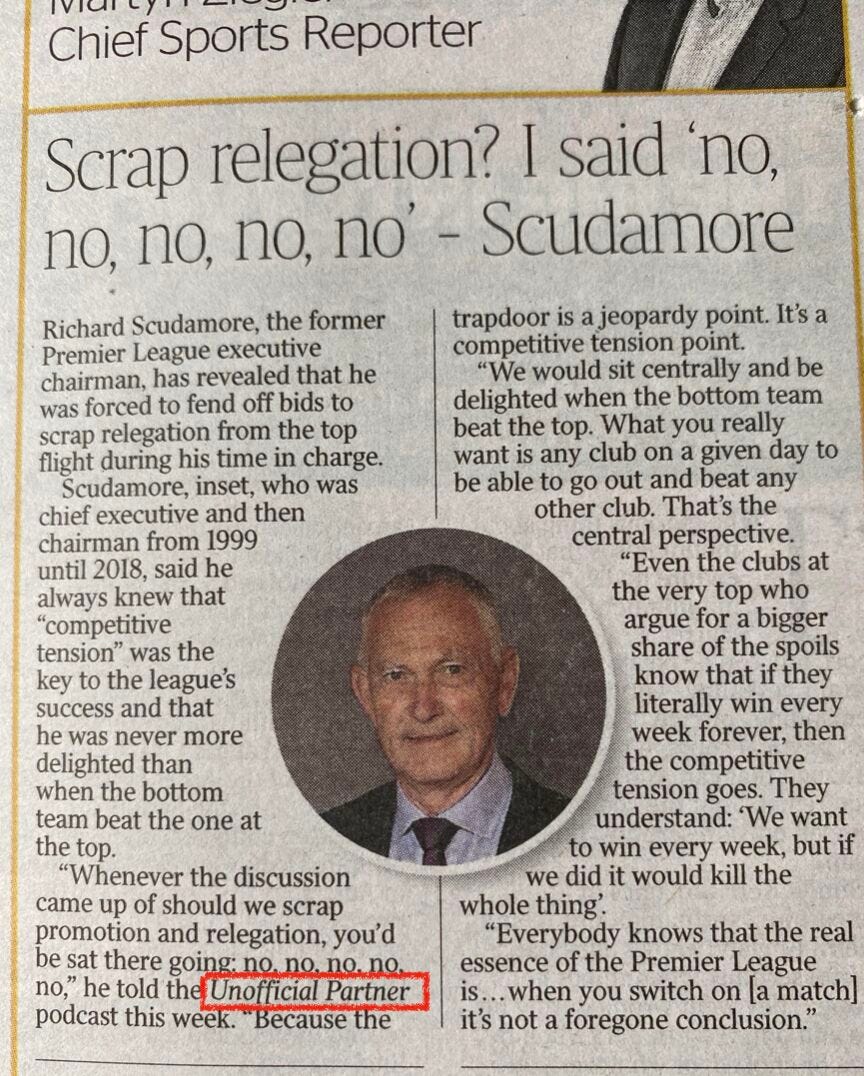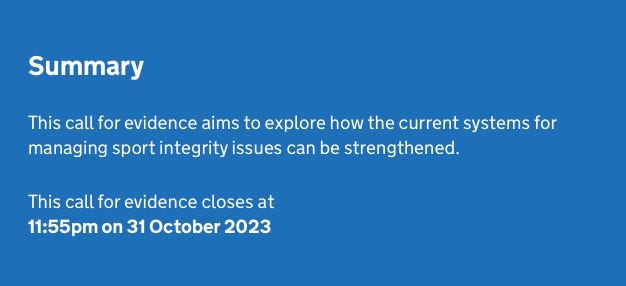The £220billion Question; Project 2030; Cricket in the Olympics; Peanuts to $150m; Unbundling athletics; Firestick as a verb; Where Shit Ideas Meet Stupid Money; The World Cup problem
Overthinking the sports business, for money
Final call for Leaders Week London
You’re leaving it a bit late, don’t yer think?
With Leaders Week London happening next week, this is a final call to secure your place.
One change you’ll notice at this year’s event will be the Podcast Hub in the main exhibition hall.
UP will be there at 1pm on Wednesday.
Come and say hello.
Use UP15 for a 15% discount on your Summit passes - visit leadersinsport.com/UP.
The £220billion Question
We’ve been working with Two Circles on a new content strand of podcasts and events.
The idea is to test some of the assumptions about where sport goes from here.
What type of sports property will be rewarded by the marketplace, and which ones will be punished?
They’ve modelled the size of the market - everything, media rights, sponsorship, merch, tickets.
The number in 2012 was £100billion.
Back then Two Circles predicted it would grow 50% to £150billion by 2022.
They were right.
Now they’re putting out a new number.
£220billion in 2032.
That’s the good news.
The fun starts when you delve beneath that headline number.
Turns out the distribution of the money won’t be equal…
Some of the Project 2030 winners are obvious.
Spoiler: the big will win big.
Football represents a disproportionate amount of that £220billion - see previous note: The Premier League has won.
The middle will be squeezed and the bottom will suffer.
Two Circles are predicting that 15% of rights holders will disappear over the next decade.
But…there will be a small number of new sports properties that will jump out of the pack and build a business model that fits the world in 2030.
But who? What? Why?
Will they emerge from within the traditional governing bodies, or from outside?
If you had a few quid to invest in a sports property for 2030, where would you put it?
The Unofficial Partner Billion Dollar Brainstorm
The brainstorm is our go-to live podcast device.
I like it because it frees people from their day jobs.
Many conference panels suffer because the guests are weighed down by their own badge.
They’re (understandably) inhibited by the consequences of venturing beyond carefully prepared comms talking points.
This is frustrating for them, and the audience.
The brainstorm is a useful conceit, that liberates them to contribute more fully.
We create a straw man, an abstraction that we can all project on to, without fear of misrepresentation.
But it is quite revealing, in terms of the received wisdoms that permeate the industry: Sport as entertainment; athlete as activist; teams as point of investment; global not local; diversity of audience; personalised media consumption.
We could add a couple more.
Armed with this playbook, there’s not a sport you can’t look to reimagine.
Where Shit Ideas Meet Stupid Money: Inner City Javelin
What if…you debundle track and field.
The IPL of Javelin. LIV, to a point. Javelin But Louder.
Team based, national franchises: Britain-y Spears (Oof)
Key insight: The current World Champion is Indian. He beat a bloke from Pakistan at the last world championships.
That’s some serious geopolitical beef right there.
Two nuclear powers going at it with sharp implements.
#Geobeef is the highest form of beef; top end Waygu compared to the confected bullshit Lidl Aldi KSI Logan Paul beef.
Then we had a vote, and my pitch for Inner City Javelin lost.
Their loss.
Alt route: The enduring allure of the Olympic Bundle
Now lay this week’s Olympic story across Two Circles’ research findings.
If you’re running a Squeezed Middle Sport, what decisions will you make today that will make your thing pop, that gets you out from the pack and in to the big Project 2030 winners?
Five sports have broken in to the Olympic bundle of sports for LA28.
Cricket, flag football, squash, baseball/softball and lacrosse.
The hope is that being in the Olympic tent will protect them from the disruption to come.
Maybe. In many ways it’s an odd strategy, if reaching a younger audience is the goal.
Someone somewhere will have done research on what Olympic inclusion has achieved for rugby, tennis and golf, previous new entrants that still feel weird.
Will cricket, for example, be rugby or basketball?
Some nice snippets from Sean Ingle’s piece in The Guardian, who quotes Michael Payne, former IOC TV and marketing chief:
“To understand what this could do to catapult cricket on to a world stage, go back to the Barcelona Games in 1992 and look at the success of basketball. There is a night and day difference between the state of the NBA internationally pre- and post‑1992.”
The figures back that up. On the opening day of the 1991-92 season, NBA rosters included just 23 international players from 18 countries. Last season there were 120 players from 40.
But obviously, it’s about money.
Negotiations, though, were not straightforward. The IOC wanted cricket. LA pushed hard for flag football and baseball/softball. Neither side had much interest in the other’s preferences. There were bitter arguments over money and numbers, too, and relations became so strained that a decision was pushed back nearly a month. Yet, in the end, an uneasy peace was brokered.
Peanuts to $150million
The TV rights for the Games in India are currently ‘peanuts’ according to Payne.
Now it can realistically expect more like $150m.
“And if you are Thomas Bach at the IOC, with a mission to promote the Olympic movement around the world, you look at your globe and you’re doing pretty well except for one glaring geographic hole: India, Pakistan and Bangladesh. And one way to short-circuit that is to put their sporting religion into the Olympic programme.”
Back in 2017, I interviewed ICC CEO Dave Richardson, on stage at SportsPro Live.
The target at that point was Paris 2024.
Sean Ingle, again in The Guardian, took notes.
T20 was the obvious vehicle for inclusion, following Rugby Sevens as the playbook.
But Richardson was candid on the challenges ahead.
The IOC want the best players to be there.
This means the ICC delivering the big IPL superstars, many of whom have ‘decoupled’ from their national teams to pursue franchise money unencumbered.
Golf has failed to guarantee the best players turn up.
The second issue is calendar.
Dave Richardson in 2017: “From an ICC perspective, the fixture calendar is the most challenging part of it. In the northern hemisphere, the Olympics are held in the English summer, so that’s a problem for them if they’ve got an Ashes series on. So there will be issues and England in the past have said: ‘Are we sure we want to go down this route?’”
No shit Sherlock.
I keep going back to Geoff Shackelford’s analysis of the impact of golf’s inclusion in the Olympics, which has wreaked havoc on the professional men’s major event calendar.
Meanwhile, as the ICC negotiates its way on to the Olympic roster, it would do well to keep an eye on it’s own product.
The World Cup Product and the absence of jeopardy
England got thrashed by New Zealand in their opening game of the ICC Cricket World Cup.
And here’s the problem.
It doesn’t matter.
They’ll still get through to the knock out phase, whenever that is.
In fact, I heard Jimmy Anderson make the point that it was a good time to lose, because ‘momentum', and the need to peak at the right time in the later stages.
Surely this is an indication that the product is wrong.
Similarly, I’m struggling to remember a time when the Rugby World Cup group stage wasn’t happening.
Running through both events is the complete absence of jeopardy until the last couple of rounds.
As a shop window, it’s counterproductive.
For every Portugal underdog story, there’s a load of boring one sided thrashings that turn off the casual viewer, the very person the event is supposed to excite and then capture.
It gets to the dilemma that sits within that £220billion Two Circles’ prediction.
It’s predicated on there being more fans for sport globally - an increase in 18% globally according to their numbers, as mentioned by Gareth Balch on the podcast.
Gareth Balch: Sport is going to win big. It's going to do much, much, much better in non male 35 to 55 year old demographics than it's ever done before. And that's going to change the shape of the ecosystem. So sports will be monetizing younger fans much better than it's ever done before, because historically it's not thought about doing that very well.
This is the key point imho.
How do existing rights holders use their event inventory to service the new audience?
There must be more to it than just making their World Cups bigger and longer.
Doing that is creating a vulnerability - a boring product - that will be exploited by new, shiny things that come to the market unencumbered by history, tradition and heritage and are free to do what they want, where they want.
And more precisely, what sports fans want.
Tricky, no?
See also: Richard Scudamore’s views on jeopardy got picked up by The Times this week, taken from last week’s podcast with Twenty First Group’s Omar Chaudhuri, who talks more sense about tournament product design than anyone across the industry right now.
UP Yours - Zero Ducks Given edition
The ever excellent Jim Salveson of Voiceworks explains the boom in cricket podcasts.
During the recent Ashes tournament Voiceworks’ Sport Social Podcast Network saw its Cricket audience almost double (96%) growth as fans of the sport turned to on-demand digital audio to hear from their favourite voices and their views on the tournament. It’s a trend that we expect to see continue into the 2023 Cricket World Cup.
Firestick becomes a verb, and other piracy news
To firestick. We firesticked. They firestick.
Usage: ‘Spurs are on later, I’ll probably firestick it’.
UP Productions' Matt Cutler was at YouGov Sport’s event in London this week, giving the piracy angle to a session on trends in the media landscape.
Listeners to our initial five-episode run of The Pirates vs The Premier League have given us tips and information to take the story further.
Matt teased some upcoming work at the event, thanks to some brilliant new research undertaken for us by YouGov Sport.
Including that more than one in three (39%) of people who watch live sport illegally do so with a dodgy Firestick or similar IPTV device.
All of which is very ironic given Amazon pays the Premier League £30m a year to show it legitimately.
I’m running a Sport’s Napster Moment panel at Sportel in Monaco.
Come say hello.
Integrity in Sport - call for evidence deadline extended
Tim Hollingsworth, CEO of Sport England, has flagged an important deadline extension.
The Government’s sport strategy included a call for evidence on integrity issues in sport - including complaint handling around safeguarding and welfare issues.
Enjoy the Unofficial Partner newsletter? Tell your friends
Subscribe to the Unofficial Partner podcast.
Help us game the Substack algorithm by liking this newsletter and spread the word on social media.
Follow @UnffclPrtnr on Twitter and Linkedin.
Read over 100 gushing five star reviews for UP on Apple Podcasts - click the link to add yours.









